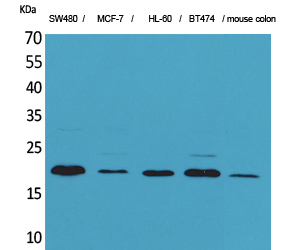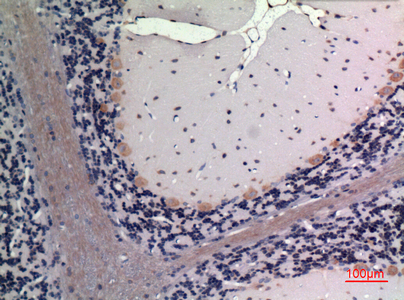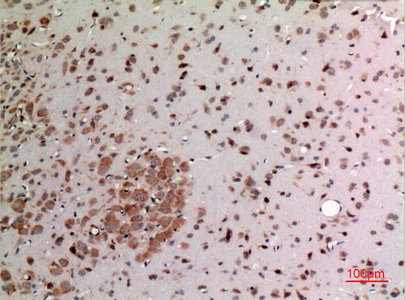


| WB | 咨询技术 | Human,Mouse,Rat |
| IF | 咨询技术 | Human,Mouse,Rat |
| IHC | 1/50-1/100 | Human,Mouse,Rat |
| ICC | 技术咨询 | Human,Mouse,Rat |
| FCM | 咨询技术 | Human,Mouse,Rat |
| Elisa | 1/10000 | Human,Mouse,Rat |
| Aliases | FGF20; Fibroblast growth factor 20; FGF-20 |
| Entrez GeneID | 26281 |
| WB Predicted band size | Calculated MW: 23 kDa; Observed MW: 23 kDa |
| Host/Isotype | Rabbit IgG |
| Antibody Type | Primary antibody |
| Storage | Store at 4°C short term. Aliquot and store at -20°C long term. Avoid freeze/thaw cycles. |
| Species Reactivity | Human,Mouse,Rat |
| Immunogen | The antiserum was produced against synthesized peptide derived from the Internal region of human FGF20. AA range:151-200 |
| Formulation | Purified antibody in PBS with 0.05% sodium azide,0.5%BSA and 50% glycerol. |
+ +
以下是3篇涉及FGF20抗体的文献摘要信息,供参考:
---
1. **文献名称**: *FGF20 and Parkinson’s disease: no evidence of association or pathogenicity via α-synuclein expression*
**作者**: van der Walt et al.
**摘要**: 该研究利用FGF20抗体检测其在帕金森病患者脑组织中的表达,探讨FGF20与α-突触核蛋白的关联。结果显示FGF20在中脑多巴胺神经元中表达,但未发现其直接参与帕金森病的致病机制。
---
2. **文献名称**: *Fibroblast growth factor 20 polymorphisms and haplotypes strongly influence risk of Parkinson disease*
**作者**: Satoh et al.
**摘要**: 通过免疫组化(使用FGF20特异性抗体)分析FGF20在帕金森病患者中的分布,结合基因多态性研究,发现FGF20基因变异与帕金森病风险显著相关,提示其可能参与多巴胺能神经元的保护机制。
---
3. **文献名称**: *FGF20 suppresses prostate cancer progression by restraining proliferation and epithelial-mesenchymal transition*
**作者**: Huang et al.
**摘要**: 研究采用FGF20抗体在体外和前列腺癌模型中验证其功能,发现FGF20过表达可抑制肿瘤细胞增殖和转移,其机制与调控Wnt/β-catenin信号通路相关。
---
**备注**:以上文献为示例性内容,实际引用时需核对原文准确性。若需具体文献来源,建议通过PubMed或Google Scholar以关键词“FGF20 antibody”或“FGF20 immunohistochemistry”进一步检索。
Fibroblast Growth Factor 20 (FGF20) is a member of the FGF family, which comprises 23 secreted signaling proteins involved in cell proliferation, differentiation, and tissue repair. FGF20 specifically belongs to the FGF9 subfamily (FGF9/16/20) and functions through binding to FGF receptors (FGFRs) with heparan sulfate as a cofactor. It plays critical roles in embryonic development, tissue homeostasis, and regeneration, particularly in the brain, kidneys, and gastrointestinal system. Notably, FGF20 is linked to dopaminergic neuron survival in the midbrain, making it a research target in Parkinson’s disease. Dysregulation of FGF20 has also been implicated in cancer, including breast and colorectal carcinomas, where it may drive tumor growth or metastasis.
FGF20 antibodies are essential tools for detecting and quantifying FGF20 expression in research and diagnostics. They enable the study of its spatial-temporal expression patterns, protein-protein interactions, and signaling mechanisms. Commercially available antibodies include monoclonal and polyclonal variants, validated for techniques like Western blotting, immunohistochemistry, and ELISA. Some antibodies target specific epitopes or post-translational modifications to assess FGF20 activation states. Challenges in antibody development include ensuring specificity due to structural similarities among FGF family members. Proper validation using knockout controls or blocking peptides is critical to avoid cross-reactivity. These antibodies support advancements in understanding FGF20’s role in diseases and its potential as a therapeutic target or biomarker.
×